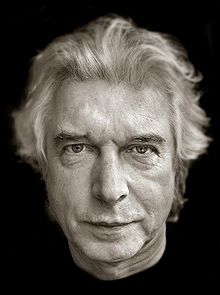Boudewijn de Groot
| Boudewijn de Groot | |
|---|---|

Photo by Filip Naudts
|
|
| Background information | |
| Birth name | Frank Boudewijn de Groot |
| Born | 20 May 1944 |
| Origin | Batavia, Java, Dutch East Indies |
| Genres | Folk |
| Occupation(s) | Singer-songwriter, guitarist |
| Instruments | Vocals, guitar |
| Years active | 1964–present |
| Labels | Decca, Philips, Mercury, Universal |
| Associated acts | Tower, Session |
| Website | www.boudewijndegroot.nl |
Frank Boudewijn de Groot (Dutch pronunciation: [ˈbʌu̯dəʋɛi̯n də ˈɣroːt], born 20 May 1944) is a Dutch singer/songwriter. He is known for the songs "Welterusten Meneer de President" (1966), "Het Land van Maas en Waal" (1967), "Jimmy" (1973) and "Avond" (1996) among others. On 20 April 2015 he issued his latest album Achter glas (Behind glass).
Boudewijn de Groot was born in wartime occupied Dutch East Indies (today known as the Republic of Indonesia) in 1944 in a Japanese concentration camp close to Batavia (today known as Jakarta) where his mother died in June 1945. In 1946, he and his family returned to the Netherlands. De Groot's father, however, was obliged to return to Indonesia, so De Groot went to stay with his aunt in Haarlem. In 1951, his father came back and in 1952, the family moved, with his new stepmother, to Heemstede. De Groot lived in Heemstede in the same street as one of his future lyricists, Lennaert Nijgh, who was a friend of De Groot's stepbrother.
In 1960, De Groot met Nijgh at the Coornhert Lyceum in Haarlem. At that time, De Groot was already singing in the style of Jaap Fischer and Jacques Brel. Lennaert Nijgh wrote his lyrics. After their high school-period they both decided to go to a film academy. In their last year, Nijgh made the short movie "Feestje Bouwen", for which De Groot wrote two songs. During one of the presentations of the movie, television journalist Ed Lautenslager became impressed with De Groot's talent, and subsequently helped him to get a contract with record label Philips. De Groot's first single, "Strand", appeared in 1964 and led to some media attention. He followed it up with "Elegie prenatale" and "De morgen", and his recurring appearances in the television show "Kaberet Kroniek" made De Groot a minor national celebrity. The single "Noordzee" in February 1964 was a much bigger hit, but the huge breakthrough came in 1966 with Lennaert Nijgh's adaptation of a song from Charles Aznavour's "Une enfant de seize ans", retitled "Meisje van 16". This was De Groot's first song to appear in a music chart. He soon quit his job to become a full-time singer. After a while, his first album Boudewijn de Groot, recorded with the Frans de Kok orchestra, was released by record label Decca.
...
Wikipedia
